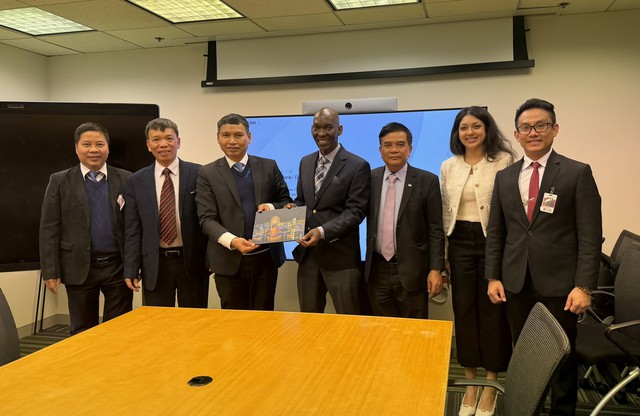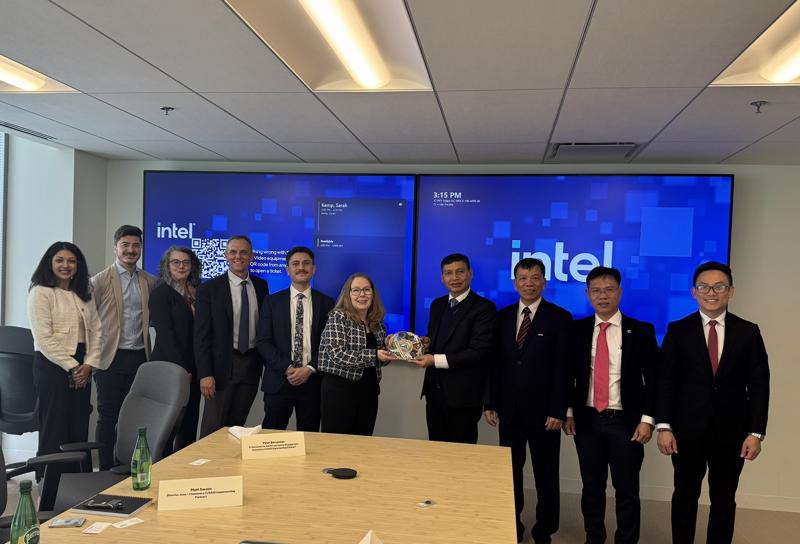Within the framework of a business trip to the US, a delegation from central Da Nang city led by Mr. Ho Ky Minh, Deputy Chairman of the Da Nang City People’s Committee, met and worked with the World Bank (WB) and the Intel Corporation in Washington D.C.
The two sides discussed and agreed upon specific cooperation content regarding support for the development of AI training in Da Nang.
Da Nang boasts suitable infrastructure for developing the field of AI, with the Da Nang Hi-Tech Park - one of three national high-tech parks - covering an area of up to 1,100 ha. It also has software parks and IT zones ready to serve the activities of enterprises coming to the city to invest, research, and develop AI.
The city has established the Da Nang Semiconductor and Artificial Intelligence Center for Research and Training (DSAC) and universities in the city have begun recruiting for semiconductor and AI training programs. DSAC will collaborate with the Intel Corporation this year to organize training courses for instructors in the field of AI to ensure there is a pool of qualified instructors.
Da Nang is currently researching and developing policies to attract analysts and overseas Vietnamese to work and contribute to the city’s semiconductor and AI development. These policies are expected to be passed in June.
The Intel Corporation strongly supports Da Nang’s development direction and commits to supporting the training of necessary human resources in the field based on an MoU it signed with DSAC in January.
It will also invite Da Nang students and researchers to participate in a global AI competition it organizes. This competition is not only an opportunity for young technologists to showcase their AI solutions but also helps develop AI skills and cooperation among generations. Ms. Sarah Kemp, Vice President of International Government Affairs at Intel, expressed agreement with the city’s proposal and Intel’s commitment to this cooperation.
The cooperation between Da Nang and Intel is not only an important step in building a standard professional workforce to meet the technology market’s needs but also opens up many new development opportunities. This not only creates job opportunities for the locality but also helps local researchers and businesses collaborate and access modern technology.
After the working session with Intel at the D.C. headquarters, the Da Nang delegation will also have a specific working session with the Intel Corporation at its main headquarters in Santa Clara to finalize the details of the program and the implementation of the AI workforce development training content in Da Nang in 2024 and subsequent years.
On the same day, the delegation also had a working session with the WB in the US.

Mr. Alex Twinomugisha, Head of the WB’s Technology and Innovation Education Group, along with representatives from the WB in Vietnam and the Intel Corporation, met and worked with the delegation.
He said the WB has been actively contributing to Vietnam’s development, especially in the field of education. It has invested $400 million to date to support universities in Vietnam in enhancing infrastructure, research centers, and management capacity, including $100 million supporting Da Nang University.
In the foreseeable future, the WB will continue to support Vietnam in implementing two major directions: Advising the Ministry of Education and Training on developing education to enhance Vietnam’s global value chain by 2045, and supporting the Ministry of Science and Technology in building resources in the semiconductor and AI fields.
Da Nang is of particular interest to the WB, and both parties have agreed to organize a meeting to discuss deeper cooperation in mid-March, after the completion of the delegation’s trip to the US.
Vietnam has the capability to develop the semiconductor field, with universities in Da Nang expanding enrollments in semiconductor engineering while Intel continues to invest in Vietnam. Mr. Twinomugisha mentioned that the WB will closely cooperate with DSAC to advise on policies to support AI research by universities in the city.
Mr. Minh thanked the WB for its support to Da Nang and also proposed that it expand its Science, Technology, Engineering, and Mathematics (STEM) training development project for high school students in the city. “The two cooperative contents regarding STEM and semiconductor workforce training are appropriate for Da Nang,” he said. “It will continue to specify and develop these contents in the time to come.”









 Google translate
Google translate